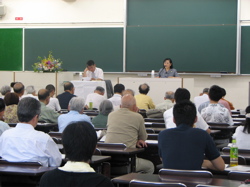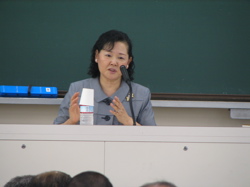Center for Interdisciplinary Study of Monotheistic Religions(CISMOR)Doshisha University
> Public Lectures > Problems in Inter-Religious Dialogue: The Understanding of Islam in the Perspective of Western GlobalizationPublic Lectures
Lecture (Open for the public)
Problems in Inter-Religious Dialogue: The Understanding of Islam in the Perspective of Western Globalization
| Date: |
2008/07/19 14:00-16:00 |
|---|---|
| Place: | Shisei-kan, Imadegawa Campus, Doshisha Univ. |
| Lecture: | Prof. Kazuko Shiojiri (University of Tsukuba) |
| Summary: | |
|
The lecture, arguing on the issues and the prospects for Islam and interfaith dialogue, began by reviewing the meaning of today’s globalization in the Islamic context. Islam is basically the religion that has succeeded the idea of globalization, due to its birth in the religiously pluralistic context of two other Semitic religions, Judaism and Christianity. But today’s globalization with its character of economic 'enclosure' has a tendency to logically reject 'others,' including Islam, beneath American ascendancy. The lecturer pointed out how today’s era of globalization in some ways resembles a former one, which could be a basis for forming interfaith dialogue. Then the lecturer referred to the dilemma of 'coexistence' in Islam’s theological ideas. Islam assumes that believers and non-believers both exist in the world, presenting inevitable 'inequality' among people in God’s presence. In that sense, we cannot avoid seeing the disconnect between this Islamic 'coexistence' and today’s notion of 'coexistence,' which means living together with equal rights and duties in the same area. This is a serious issue for any religion. The system of coexistence constructed in the history of Islam is under the control of Islamic institutions of superiority such as the concept of Zimmi. In this context, therefore, we could never see nations governed by 'equal rights and duties.' However, this structure didn’t cause repressive relationships between Muslims and non-Muslims at the civilian level. Nevertheless, worldwide misapprehension and prejudice about Islam has had a tendency to regard this tendency, common among all religions, 'to recognize the superiority of their own religion' as a peculiarly headstrong characteristic unique to Islam. The lecturer brought up one example of today’s Muslim scholars approaching this issue in the case of Tariq Ramadan in Europe. Professor Ramadan picks up the word 'Tawhid,' a central expression of Islamic monotheism, and explains its original meaning as 'to be with God is to be with people.' Ramadan says all Muslims are finally obliged to witness their own religion toward the non-Muslim community. This attitude is directly linked to another assertion of his, that European Muslims have to face the issue of 'citizenship.' For Professor Ramadan, what is important for Muslim communities of Europe, formed through emigration and coexistence, is to build a relationship with European society as citizens. Since religions divide people into believers and non-believers, some say nonverbal dialogue without knowing each other’s religious teachings is more significant. But as the Catholic abbé Hans Kung said: 'there is no dialogue among religions without seeking the base of religions.' With this, the lecturer concluded by confirming the necessity of carrying on study of each other’s religious teachings in order to cast aside prejudice and the disdain of Islam. Kenichiro Takao (Graduate Student of School of Theology, Doshisha University) |
|
|
Handout |
|

